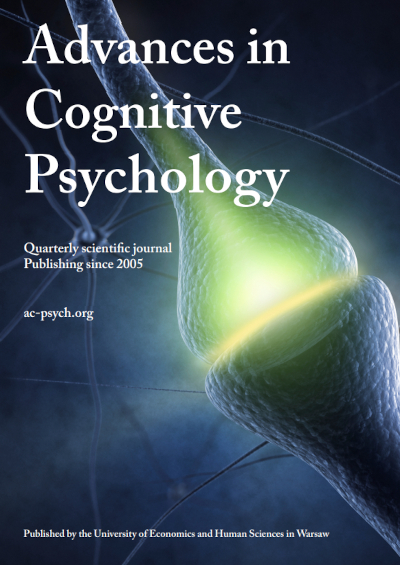About this journal
Advances in Cognitive Psychology (ACP) is an open access, quarterly peer-reviewed scientific journal dedicated to research on cognitive models of various aspects of psychology.
Since the 1970s, researchers have tried to understand the way mental and cognitive systems influence various behaviors and attitudes, how such systems develop, what are their functional, evolutionary origins, and what are their physical and psychological processes. Our journal attempts to disseminate original empirical (2.5k word brief reports; 5k single study; 10K word multistudy) and theoretical/review/meta-analyses articles (10K word), as well as replications (2.5k word brief reports), reports of null findings (2.5k word brief reports), and literature reviews (10K word) about research that places the mind and mental processes as central features of psychological systems and research as opposed to purely environmentally deterministic or behaviorist models.
To do so, our journal is broken up into three parts, run by Section Editors and reviewed by specialized academics from around the world: Attitudes, Beliefs, and Behavior (Andrew G. Thomas); Cognition, Intelligence, and Thinking (Charles-Étienne Benoit); and Personality and Individual Differences (Radosław Rogoza). Please see the Author Guidelines section for details and submission instructions.
ACP also promotes and encourages open science, pre-registration of study and is a peer community in registered reports (PCI RR) - friendly journal. We are also indexed in a range of major databases, including PubMed, Scopus, JCR, and PsycINFO (eISSN: 1895-1171).
Advances in Cognitive Psychology is published by VIZJA University, Poland. Advances in Cognitive Psychology is co-financed by the Ministry of Education and Science (Ministerstwo Edukacji i Nauki) under the program "Rozwój czasopism naukowych," RCN/SN/0494/2021/1.
Issue 2 On line: 25 May 2025
The Detrimental and Beneficial Effects of Collaboration in Episodic Memory are Sensitive to Both Emotional Valence and Directed Forgetting
Aiqing Nie, Bingyan Guo, Qiao Wang

Aiqing Nie, Department of Psychology, School of Education Science, Shanxi Normal University, 339 Taiyu Road, Taiyuan, China 030031.
Email: nieaiq@126.com
Collaborative memory research has uncovered both detrimental and beneficial effects. However, it remains unclear whether these phenomena are present in the item-method directed forgetting procedure. It is unclear whether they are sensitive to the emotional valence of stimuli and whether they vary in subtypes of episodic memory. To address these issues, we introduced the item-method directed forgetting (DF) procedure into collaborative memory using the free-flowing procedure. Participants studied positive, neutral, and negative words followed by either a remember or forget cue. Two test sessions (Recall 1 and 2) were conducted, which assessed both item memory and source memory. Recall 1 was performed either individually or collaboratively, while Recall 2 was always conducted individually. The results revealed that the amplitude of the detrimental effect of collaborative inhibition was influenced by the interaction of emotional valence with cue. Specifically, emotional words had a stronger impact on the to-be-forgotten (TBF) case compared to the to-be-remembered (TBR) case in terms of amplitude. This effect surpassed the effect of neutral words, indicating more strategy disruption for the emotional words. The error pruning occurred in both memory tasks during the ongoing collaboration, but was absent after collaboration. The post-collaborative memory benefit was considerably greater for TBR words compared to TBF words. This demonstrates that the mechanisms to enhance the post-collaborative performance of the retrieval strategy disruption hypothesis (RSDH) are more likely to impact stimuli that have been subjected to elaborative rehearsal. These results are discussed concerning the RSDH and other possible explanations.
Keywords: episodic memory, directed forgetting, emotional valence, collaboration, collaborative inhibition, error pruning, post-collaborative memory, benefitReligious Meaning System and Fear of Death in Older Adults: The Longitudinal Mediation Analysis of Wisdom and Meaning- Making
Dariusz Krok, Paweł Jan Brudek

Dariusz Krok, Institute of Psychology, Opole University; Plac Stanisława Staszica 1; 45-052 Opole, Poland.
Email: dkrok@uni.opole.pl
A close examination of recent studies in these fields demonstrated that relationships between religion and fear of death are likely to be mediated by the structures of wisdom and meaning-making. In this study, we investigated a parallel longitudinal mediation of wisdom and meaning-making in the association between the religious meaning system and fear of death in older adults. A longitudinal study with triplicate measurements was conducted on a sample of 270 Polish older adults (141 women and 129 men; Mage = 68.32 years, SD = 6.32). Four questionnaires were used: the Religious Meaning System Questionnaire, the Three-Dimensional Wisdom Scale, the Fear of Death Scale, and the Meaning-Making Questionnaire. The serial mediation analysis with a bias-corrected bootstrapping method showed that the relationship between the religious meaning system and fear of death was mediated by meaning-making and wisdom. These results suggest that one’s religious meaning system, through increasing both meaning-making processes and wisdom, has a positive effect on decreasing fear of death. The intrapersonal structures of meaning and wisdom thus play a significant role within the gerotranscendental model of positive aging.
Keywords: religious meaning system, fear of death, wisdom, meaning-making, older adultsMotor Fluency and Preference Judgments: Typing Speed as a Predictor of Letter Dyad Likeability
Mara Stockner, Giuliana Mazzoni, Francesco Ianì

Mara Stockner, Sapienza University of Rome, Department of Dynamic and Clinical Psychology, and Health Studies Via degli Apuli, 1, 00185 Rome, Ital.
Email: mara.stockner@uniroma1.it
The literature on embodied cognition has shown that the perception of action-related stimuli can trigger a covert motor simulation of the action usually associated with these stimuli. Such simulation is thus closely linked to previous experiences with the objects and hence to memory processes. Preliminary evidence shows that sensorimotor fluency originating from the motor system can influence higher cognitive processes, such as preference judgments, when observing action-related stimuli, such as letter dyads (e.g., FA, TR): fluent (i.e., easier to type) dyads on the QWERTY keyboard are preferred over nonfluent dyads. These effects were attributed to the automatic activation of fluent motor programs during the observation of dyads. With the aim of gaining a better understanding of the role of fluency in preference judgments, we further investigated this effect by comparing slow and fast typists who should have different motor programs associated with the dyads and should therefore show different preferences. Our results show that fluency affects likeability of letter dyads, but in different ways for slow and fast typists: slow participants showed a preference for fluent dyads, while fast participants did not. We concluded that fast typists, who are characterized by greater typing skills, considered both types of dyads as subjectively fluent, leading to no specific preferences, while slow typists, who are characterized by lower typing skills, preferred easy dyads.
Keywords: motor fluency, preference judgments, simulation, keyboard


